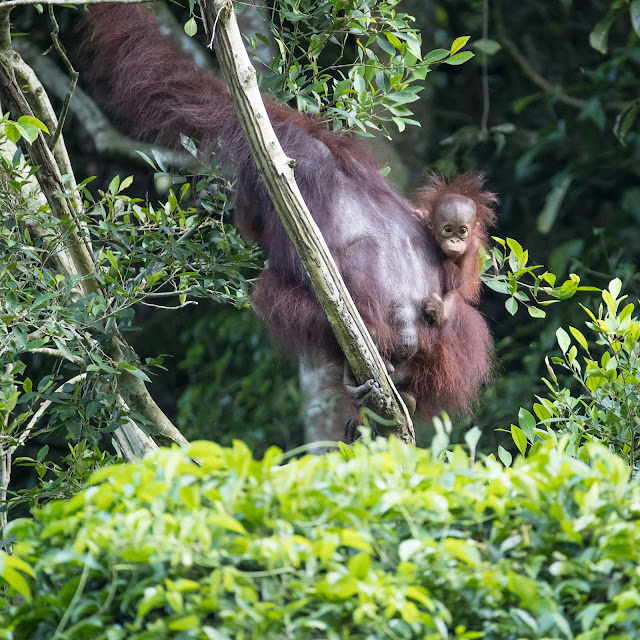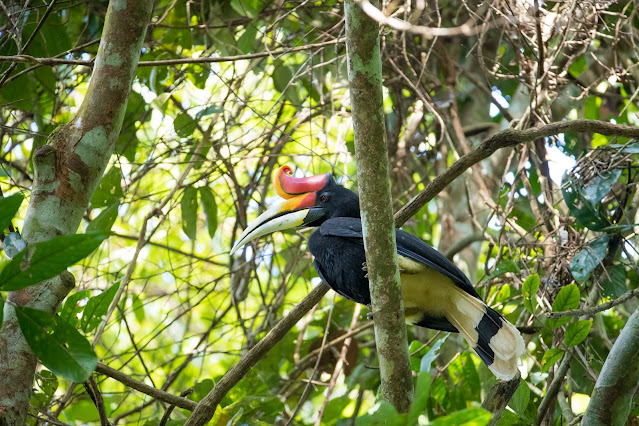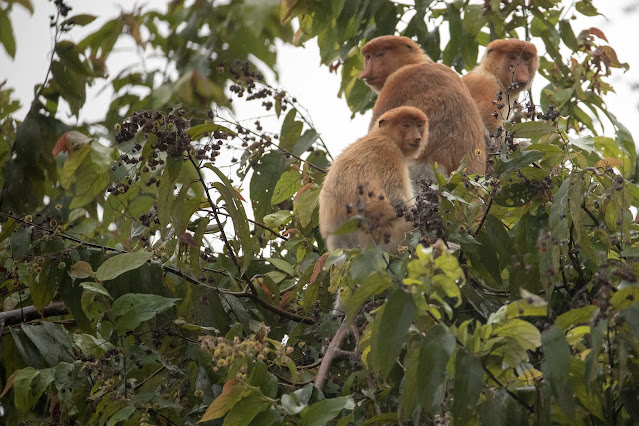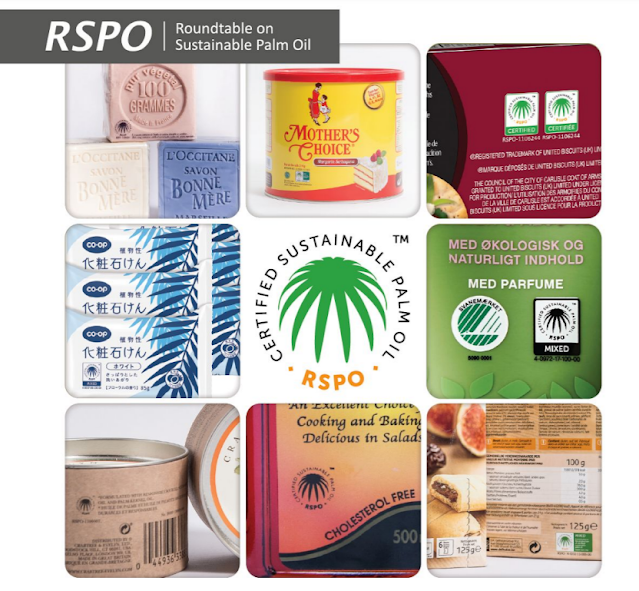Posted by Elizabeth Bacher, Communications
Can you really make a difference for endangered species from the grocery store? YES!
Companies that make the things you shop for are mostly after one goal: to sell their product. That means they’re more likely to change the way they do things—to be more eco-friendly, for instance—if you tell them it influences your buying decisions.
One conservation concern where consumers like you are making a real difference is palm oil. Maybe you’re familiar with the buzz about it, or maybe it’s the first time you’re hearing about it. The problems with palm oil are complex—even confusing. But the solutions don’t have to be. Let’s cut through some of the clutter about this ubiquitous ingredient that’s in thousands of products you shop for every day.
What is it? Palm oil is an edible vegetable oil that is known by many different names. It is a common ingredient in many packaged foods and household products. Everything from skim milk and peanut butter to shampoo, toothpaste and cosmetics might contain palm oil or one of its many derivatives. Palm oil is relatively healthy and inexpensive, which is why so many companies use it in their products. So, then what’s all the fuss about?
Yet, boycotting palm oil is not the answer. Why? The demand for vegetable oil is only growing worldwide, and alternatives to palm oil such as soybean, corn and rapeseed can take up to nine times as much land to produce competitive yields. Highly efficient, versatile and relatively healthy, palm oil is here to stay, so it is up to us to demand transparency and sustainability in its production.
A sustainable solution. Woodland Park Zoo believes a more realistic solution is to support the use of certified, sustainable palm oil. The Roundtable on Sustainable Palm Oil, known as the RSPO, is bringing together all the important stakeholders—palm oil producers and traders, consumer goods manufacturers, retailers, investors, environmental and human rights groups and labor organizations. Together, they are helping to create global standards for palm oil production that include halting any further deforestation as well as supporting indigenous people and communities in areas where palm oil is grown and processed.
The RSPO is still a relatively young organization—formed less than 20 years ago. Its certification guidelines are still evolving based on the latest science and input from stakeholders, but there is no doubt its members are raising awareness about the problems and solutions related to palm oil production. All of that means more transparency for you, the consumer, about how the foods and products you buy are produced.
How to make sustainable choices
Ahead of your next shopping trip, download the free Sustainable Palm Oil Shopping Guide app made by our friends at Cheyenne Mountain Zoo. Then use the barcode scanner or product look-up tools in the app next time you’re at the store. You can quickly discover if a product is made by a company that is RSPO certified or look up alternatives on the spot.
Can you really make a difference for endangered species from the grocery store? YES!
 |
| Sumatran orangutan, Godek. Photo: Jeremy Dwyer-Lindgren/Woodland Park Zoo |
Companies that make the things you shop for are mostly after one goal: to sell their product. That means they’re more likely to change the way they do things—to be more eco-friendly, for instance—if you tell them it influences your buying decisions.
 |
| This little baby Bornean orangutan and his mother need protected forests to survive. Photo: Jeremy Dwyer-Lindgren/Woodland Park Zoo |
One conservation concern where consumers like you are making a real difference is palm oil. Maybe you’re familiar with the buzz about it, or maybe it’s the first time you’re hearing about it. The problems with palm oil are complex—even confusing. But the solutions don’t have to be. Let’s cut through some of the clutter about this ubiquitous ingredient that’s in thousands of products you shop for every day.
 |
| Wild hornbill in Borneo, Malaysia. Photo: Jeremy Dwyer-Lindgren/Woodland Park Zoo |
What is it? Palm oil is an edible vegetable oil that is known by many different names. It is a common ingredient in many packaged foods and household products. Everything from skim milk and peanut butter to shampoo, toothpaste and cosmetics might contain palm oil or one of its many derivatives. Palm oil is relatively healthy and inexpensive, which is why so many companies use it in their products. So, then what’s all the fuss about?
 |
| This family of proboscis monkeys in Borneo, needs protected forests in order to survive. Photo: Jeremy Dwyer-Lindgren/Woodland Park Zoo |
Why is it a problem? The problem isn’t with palm oil per se, but rather with how and where it’s grown. More than 85% of the global supply of palm oil comes from habitat that used to be tropical forests in Indonesia and Malaysia. These are the same forests that are home to critically endangered wildlife such as orangutans, gibbons, siamangs, tigers, elephants, tapirs, hornbills and more. Every day, thousands of acres of rain forest habitat in southeast Asia are cut down to make way for more palm oil plantations when growth is managed unsustainably. The animals that live there are being pushed, acre by acre, toward extinction. As the forest disappears, more carbon can spew into the atmosphere, contributing to climate change that threatens all of us.
 |
| Palm fruit, ready to be crushed and made into oil. Photo: Jeremy Dwyer-Lindgren/Woodland Park Zoo |
Yet, boycotting palm oil is not the answer. Why? The demand for vegetable oil is only growing worldwide, and alternatives to palm oil such as soybean, corn and rapeseed can take up to nine times as much land to produce competitive yields. Highly efficient, versatile and relatively healthy, palm oil is here to stay, so it is up to us to demand transparency and sustainability in its production.
 |
| Malayan tapirs at Woodland Park Zoo. Photo: Jeremy Dwyer-Lindgren/Woodland Park Zoo |
Watch: Palm Oil Solutions, https://youtu.be/dOWhf52YIbA
A sustainable solution. Woodland Park Zoo believes a more realistic solution is to support the use of certified, sustainable palm oil. The Roundtable on Sustainable Palm Oil, known as the RSPO, is bringing together all the important stakeholders—palm oil producers and traders, consumer goods manufacturers, retailers, investors, environmental and human rights groups and labor organizations. Together, they are helping to create global standards for palm oil production that include halting any further deforestation as well as supporting indigenous people and communities in areas where palm oil is grown and processed.
 |
| Malayan tiger, Bumi. Photo: Jeremy Dwyer-Lindgren/Woodland Park Zoo |
The RSPO is still a relatively young organization—formed less than 20 years ago. Its certification guidelines are still evolving based on the latest science and input from stakeholders, but there is no doubt its members are raising awareness about the problems and solutions related to palm oil production. All of that means more transparency for you, the consumer, about how the foods and products you buy are produced.
How to make sustainable choices
Ahead of your next shopping trip, download the free Sustainable Palm Oil Shopping Guide app made by our friends at Cheyenne Mountain Zoo. Then use the barcode scanner or product look-up tools in the app next time you’re at the store. You can quickly discover if a product is made by a company that is RSPO certified or look up alternatives on the spot.
Increasingly, companies committed to sustainable palm oil are opting to include the RSPO seal with the palm fronds on their packaging. Some products might not have the seal yet, but might still have information on the packaging showing that they support sustainable palm oil sourcing. These messages are there because the companies that make these products have heard from people like you—people who‘ve told them that sustainability matters when it comes to what you want to see on store shelves.
If a company you like is not yet committed to certified, sustainable palm oil, use our letter template to tell them you’d like to see them join the RSPO.
Companies are listening. More than 10 years ago, two young Girl Scouts were really disappointed to learn that the very cookies they were selling were not made with sustainably-sourced palm oil. They cared about tropical rain forests, orangutans and other wildlife, so they got busy and started a movement that changed the way Girl Scout cookies are made and marketed throughout the whole country! You can read their story here. Thanks to them we can now enjoy those Thin Mints and Do-si-dos with the confidence that they’re made with RSPO certified sustainable palm oil.
Lots of the brands you know and love are members of the RSPO now too—including the companies that make sweet treats like Hershey’s, Reese's, M&Ms, Cadbury and more! Since palm oil is so ubiquitous, we like to think it helps to start somewhere to develop the habit of shopping with intention. For those with a sweet tooth, step one could be bookmarking our sustainable candy guide at zoo.org/palmoil.
So go look for those seals and check the websites and apps. If you don’t find the info you need, contact the company. And if you DO, know that voices like yours made that happen!
Companies are listening. More than 10 years ago, two young Girl Scouts were really disappointed to learn that the very cookies they were selling were not made with sustainably-sourced palm oil. They cared about tropical rain forests, orangutans and other wildlife, so they got busy and started a movement that changed the way Girl Scout cookies are made and marketed throughout the whole country! You can read their story here. Thanks to them we can now enjoy those Thin Mints and Do-si-dos with the confidence that they’re made with RSPO certified sustainable palm oil.
Lots of the brands you know and love are members of the RSPO now too—including the companies that make sweet treats like Hershey’s, Reese's, M&Ms, Cadbury and more! Since palm oil is so ubiquitous, we like to think it helps to start somewhere to develop the habit of shopping with intention. For those with a sweet tooth, step one could be bookmarking our sustainable candy guide at zoo.org/palmoil.
So go look for those seals and check the websites and apps. If you don’t find the info you need, contact the company. And if you DO, know that voices like yours made that happen!




Comments
Post a Comment